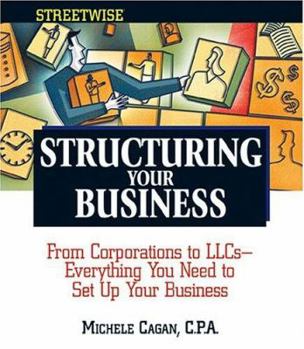Streetwise Structuring Your Business
How a business owner decides to structure his business can have long- term ramifications on tax liability, profits, managerial control and personal liability. This description may be from another edition of this product.
Format:Paperback
Language:English
ISBN:1593371772
ISBN13:9781593371777
Release Date:October 2004
Publisher:Adams Media Corporation
Length:368 Pages
Weight:1.55 lbs.
Dimensions:1.0" x 8.1" x 9.1"
Customer Reviews
1 rating
A wonderful book that will help you considerably in choosing an entity for your new business.
Published by Thriftbooks.com User , 18 years ago
This is a wonderful book for wanta-be entrepreneurs and small business owners to read and study. It is very well organized and written, and I know of no other publication available right now that covers the same material in as much depth. The author is right on the mark when she says an entrepreneur needs to understand "choice of legal entity" when starting a business. Although this book is mostly about choice of legal entity, it is also about starting and running a small business. The author discusses the importance of business plans and some of the other considerations someone starting a small business must think about. She tells us where to get help writing business plans, and she also provides some Web site URLs that are great resources on the subject. The book is divided into six parts: 1. How to Get Started in Business 2. Sole Proprietorships 3. Partnerships 4. Corporations 5. Limited Liability Companies 6. Evaluating Your Options I particularly enjoyed the Introduction, Part 1 and Part 6. I agreed with much of what was said in Part 1, but I thought the author went a little overboard in recommending that an entrepreneur hire accountants and lawyers to do as much work as she suggested. My take on the matter is that an entrepreneur needs to understand and know a lot of what both accountants and lawyers can do for them. But accountants and lawyers are notorious for not educating their clients and just doing the work for a fee. An entrepreneur should learn about bookkeeping, taxes, and how to form a corporation or LLC. And after doing that they can then go to an accountant or attorney to have them do the work (or they can do the work themselves or have someone in-house do it for them). All in all, this is a wonderful book. It would be a bit more credible if an attorney had written it instead of a CPA, but the author has done a marvelous job in putting this book together considering her background. I think it is fair for me to say that since I am both an attorney and a CPA. I have recommended this book to many of my SCORE clients who are trying to choose an entity form for their new businesses. Consider the following comments I have related to this book: Today I generally recommend an entrepreneur consider forming either an LLC or a C Corporation. Both will allow the entrepreneur to limit his or her exposure to liability. The LLC might cost a little more to form since any multi-member LLC needs to have an Operating Agreement, but it is cheaper to operate after forming it. An LLC can be taxed as a sole proprietorship (single member), a partnership (multi-member), or as a C Corporation. From that standpoint it is very flexible. The downside to an LLC is that it's not so easy to bring in investors down the road and to take on and get rid of members. If you have plans for your small business to grow quickly or you want to sell it in 5 years or less, then choosing a C Corporation for your new business' choice of entity is probably the way to





